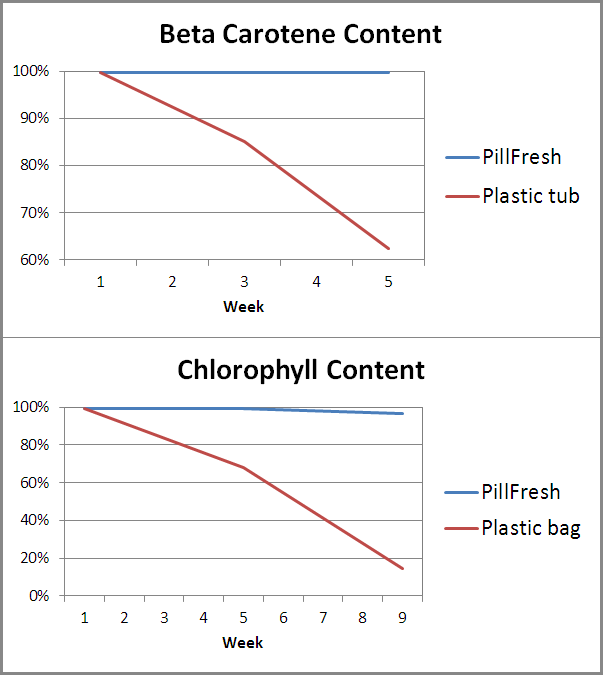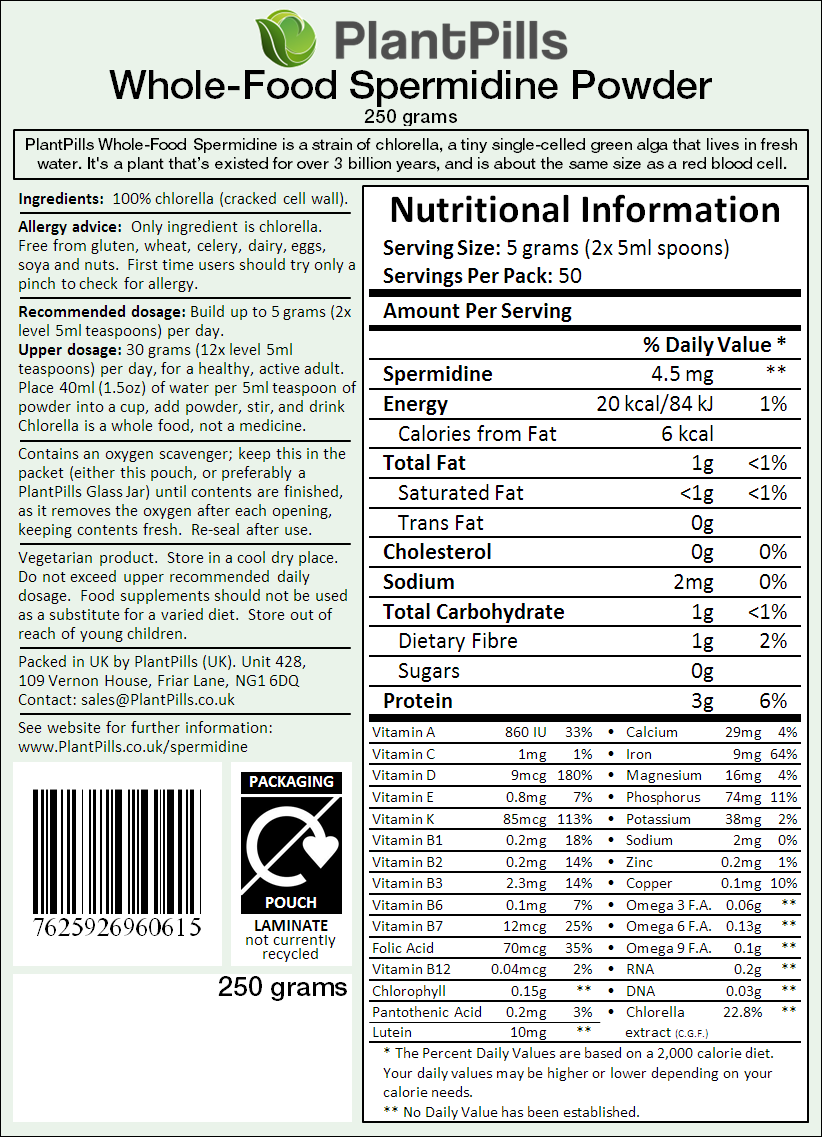Please find all sources and references listed below. Please note that none of these sources are affiliated with PlantPills.
|
1
|
Modulation of cellular function by polyamines.
Igarashi K, Kashiwagi K.
Int J Biochem Cell Biol. 2010. 42:39–51.
|
|
2
|
Functions of polyamines in mammals.
A. E. Pegg
J. Biol. Chem. 291, 14904–14912 (2016). doi: 10.1074/jbc. R116.731661; pmid: 27268251
|
|
3
|
The importance of dietary polyamines in cell regeneration and growth
S. Bardócz et al.
Br. J. Nutr. 73, 819–828 (1995). doi: 10.1079/BJN19950087; pmid: 7632663
|
|
4
|
Modulation of cellular function by polyamines
K. Igarashi, K. Kashiwagi
Int. J. Biochem. Cell Biol. 42, 39–51 (2010). doi: 10.1016/j.biocel.2009.07.009; pmid: 19643201
|
|
5
|
Modulation of learning and memory by natural polyamines.
G. P. Guerra, M. A. Rubin, C. F. Mello
Pharmacol. Res. 112, 99–118 (2016). doi: 10.1016/j.phrs.2016.03.023; pmid: 27015893
|
|
6
|
Induction of autophagy by spermidine promotes longevity.
T. Eisenberg et al.
Nat. Cell Biol. 11, 1305–1314 (2009). doi: 10.1038/ncb1975; pmid: 19801973
|
|
7
|
Autophagy and aging.
Rubinsztein DC, Marino G, Kroemer G.
Autophagy and aging. Cell. 2011. 146:682–95.
|
|
8
|
Polyamines in foods: development of a food database
Ali, Mohamed Atiya; Poortvliet, Eric; Strömberg, Roger; Yngve, Agneta.
Food Nutr Res. 2011, 55: 5572. doi:10.3402/fnr.v55i0.5572. PMC 3022763. PMID 21249159
|
|
9
|
Brochure on Polyamines, rev. 2 (PDF)
Japan: Oryza Oil & Fat Chemocial Co., Ltd. 2011-12-26.
PDF file
|
|
10
|
Higher spermidine intake is linked to lower mortality: a prospective population-based study
Stefan Kiechl, Raimund Pechlaner, Peter Willeit, Marlene Notdurfter, Bernhard Paulweber, Karin Willeit, Philipp Werner, Christoph Ruckenstuhl, Bernhard Iglseder, Siegfried Weger, Barbara Mairhofer, Markus Gartner, Ludmilla Kedenko, Monika Chmelikova, Slaven Stekovic, Hermann Stuppner, Friedrich Oberhollenzer, Guido Kroemer, Manuel Mayr, Tobias Eisenberg, Herbert Tilg, Frank Madeo, Johann Willeit
The American Journal of Clinical Nutrition, Volume 108, Issue 2, August 2018, Pages 371–380, https://doi.org/10.1093/ajcn/nqy102
Clinical trials data
|
|
11
|
Induction of autophagy by spermidine promotes longevity
Eisenberg T, Knauer H, Schauer A, Buttner S, Ruckenstuhl C, Carmona-Gutierrez D, Ring J, Schroeder S, Magnes C, Antonacci L, et al.
Nat Cell Biol 2009;11:1305-14.
|
|
12
|
Spermidine Prolongs Lifespan and Prevents Liver Fibrosis and Hepatocellular Carcinoma by Activating MAP1S-Mediated Autophagy
Yue F, Li W, Zou J, Jiang X, Xu G, Huang H, Liu L.
Cancer Res 2017;77:2938-51.
|
|
13
|
Cardioprotection and lifespan extension by the natural polyamine spermidine
Eisenberg T, Abdellatif M, Schroeder S, Primessnig U, Stekovic S, Pendl T, Harger A, Schipke J, Zimmermann A, Schmidt A, et al.
Nat Med 2016;22:1428-38.
|
|
14
|
Induction of autophagy by spermidine promotes longevity
T. Eisenberg et al.
Nat. Cell Biol. 11, 1305–1314 (2009).
doi: 10.1038/ncb1975; pmid: 19801973
|
|
15
|
Spermidine and spermine are enriched in whole blood of nona/centenarians
S. Pucciarelli et al.
Rejuvenation Res. 15, 590–595 (2012). doi: 10.1089/rej.2012.1349; pmid: 22950434
|
|
16
|
Restoring polyamines protects from ageinduced memory impairment in an autophagy-dependent manner.
V. K. Gupta et al.
Nat. Neurosci. 16, 1453–1460 (2013). doi: 10.1038/nn.3512; pmid: 23995066
|
|
17
|
Polyamines in mammalian ageing: An oncological problem, too? A review.
G. Scalabrino, M. E. Ferioli
Mech. Ageing Dev. 26, 149–164 (1984). doi: 10.1016/0047-6374(84)90090-3; pmid: 6384679
|
|
18
|
Decrease in polyamines with aging and their ingestion from food and drink.
K. Nishimura, R. Shiina, K. Kashiwagi, K. Igarashi
J. Biochem. 139, 81–90 (2006). doi: 10.1093/jb/mvj003; pmid: 16428322
|
|
19
|
Long-term oral polyamine intake increases blood polyamine concentrations.
K. Soda et al.
J. Nutr. Sci. Vitaminol. (Tokyo) 55, 361–366 (2009). doi: 10.3177/jnsv.55.361; pmid: 19763038
|
|
20
|
Polyamines in foods: Development of a food database.
M. Atiya Ali, E. Poortvliet, R. Strömberg, A. Yngve
Food Nutr. Res. 55, (2011). doi: 10.3402/fnr.v55i0.5572; pmid: 21249159
|
|
21
|
Development of a polyamine database for assessing dietary intake.
C. Zoumas-Morse et al.
J. Am. Diet. Assoc. 107, 1024–1027 (2007). doi: 10.1016/j.jada.2007.03.012; pmid: 17524725
|
|
22
|
Spermidine in health and disease
Frank Madeo, Tobias Eisenberg, Federico Pietrocola, Guido Kroemer
Science, 26 January 2018
|
|
23
|
Metabolic control of longevity
C. López-Otín, L. Galluzzi, J. M. P. Freije, F. Madeo, G. Kroemer
Cell 166, 802–821 (2016). doi: 10.1016/j.cell.2016.07.031; pmid: 27518560
|
|
24
|
Extending healthy life span—From yeast to humans
L. Fontana, L. Partridge, V. D. Longo
Science 328, 321–326 (2010). doi: 10.1126/science.1172539; pmid: 20395504
|
|
25
|
The Effects of Calorie Restriction on Autophagy: Role on Aging Intervention
Ki Wung Chung and Hae Young Chung
Nutrients 2019
|
|
26
|
Caloric restriction mimetics: Towards a molecular definition
F. Madeo, F. Pietrocola, T. Eisenberg, G. Kroemer
Nat. Rev. Drug Discov. 13, 727–740 (2014). doi: 10.1038/nrd4391; pmid: 25212602
|
|
27
|
Resveratrol Increases Intracellular NAD+ Levels Through Up regulation of The NAD+ Synthetic Enzyme Nicotinamide Mononucleotide Adenylyltransferase
Ross S. Grant
University of New South Wales, Pharmacology, 5 May 2010
|
|
28
|
Spermidine and resveratrol induce autophagy by distinct pathways converging on the acetylproteome
E. Morselli et al.
J. Cell Biol. 192, 615–629 (2011).
|
|
29
|
Spermidine and spermine are enriched in whole blood of nona/centenarians.
S. Pucciarelli et al.
Rejuvenation Res. 15, 590–595 (2012). doi: 10.1089/rej.2012.1349; pmid: 22950434
|
|
30
|
Are milk polyamines preventive agents against food allergy?
Dandrifosse G, Peulen O, El Khefif N, Deloyer P, Dandrifosse AC, Grandfils C.
Proc Nutr Soc. 2000;59(1):81-86. doi:10.1017/s0029665100000100
|
|
31
|
Essential role for autophagy in lifespan extension.
Madeo, F., Zimmermann, A., Maiuri, M.C. & Kroemer, G.
J. Clin. Invest. 125, 85–93 (2015).
|
|
32
|
Restoring polyamines protects from age-induced memory impairment in an autophagy-dependent manner.
Gupta, V.K. et al.
Nat. Neurosci. 16, 1453–1460 (2013).
|
|
33
|
Spermidine protects against α-synuclein neurotoxicity.
Büttner, S. et al.
Cell Cycle 13, 3903–3908 (2014).
|
|
34
|
Autophagy activators rescue and alleviate pathogenesis of a mouse model with proteinopathies of the TAR DNA-binding protein 43.
Wang, I.-F. et al.
Proc. Natl. Acad. Sci. USA 109, 15024–15029 (2012).
|
|
35
|
Cardioprotection and lifespan extension by the natural polyamine spermidine.
Eisenberg, T., Abdellatif, M., Schroeder, S. et al.
Nat Med 22, 1428–1438 (2016). https://doi.org/10.1038/nm.4222
|
|
36
|
Circadian Clock Control by Polyamine Levels through a Mechanism that Declines with Age
Zwighaft, Ziv et al.
Cell Metabolism, Volume 22, Issue 5, 874 - 885
|
|
37
|
Circadian clock control by polyamine levels through a mechanism that declines with age.
Z. Zwighaft et al.
Cell Metab. 22, 874–885 (2015). doi: 10.1016/j.cmet.2015.09.011; pmid: 26456331
|
|
38
|
Polyamine-rich food decreases age-associated pathology and mortality in aged mice.
K. Soda, Y. Dobashi, Y. Kano, S. Tsujinaka, F. Konishi
Exp. Gerontol. 44, 727–732 (2009). doi: 10.1016/j.exger.2009.08.013; pmid: 19735716
|
|
39
|
Polyamines in renal failure.
K. Igarashi, S. Ueda, K. Yoshida, K. Kashiwagi
Amino Acids 31, 477–483 (2006). doi: 10.1007/s00726-006-0264-7; pmid: 16554974
|
|
40
|
The National Institute of Diabetes and Digestive and Kidney Diseases
Link
|
|
41
|
Regulation of autophagy by cytosolic acetylcoenzyme
G. Mariño et al.
A. Mol. Cell 53, 710–725 (2014). doi: 10.1016/j.molcel.2014.01.016; pmid: 24560926
|
|
42
|
Spermidine promotes human hair growth and is a novel modulator of human epithelial stem cell functions.
Ramot Y, Tiede S, Bíró T, Abu Bakar MH, Sugawara K, Philpott MP, Harrison W, Pietilä M, Paus R.
PLoS One. 2011;6(7):e22564. doi: 10.1371/journal.pone.0022564. Epub 2011 Jul 27. PMID: 21818338; PMCID: PMC3144892.
|
|
43
|
The metabolomic signature of extreme longevity: naked mole rats versus mice.
Viltard M, Durand S, Pérez-Lanzón M, Aprahamian F, Lefevre D, Leroy C, Madeo F, Kroemer G, Friedlander G.
Aging (Albany NY). 2019 Jul 24;11(14):4783-4800. doi: 10.18632/aging.102116. PMID: 31346149; PMCID: PMC6682510.
|
|
44
|
Spermidine: a physiological autophagy inducer acting as an anti-aging vitamin in humans?
Madeo F, Bauer MA, Carmona-Gutierrez D, Kroemer G.
Autophagy. 2019 Jan;15(1):165-168. doi: 10.1080/15548627.2018.1530929. Epub 2018 Oct 11. PMID: 30306826; PMCID: PMC6287690.
|
|
45
|
Molecular Basis of the ‘Anti-Aging' Effect of Spermidine and Other Natural Polyamines - A Mini-Review.
Minois N
Gerontology 2014;60:319-326. doi: 10.1159/000356748
|
|
46
|
The effect of salt stress on polyamine biosynthesis and content in mung bean plants and in halophytes.
Friedman R, Altman A, Levin N.
Physiol Plant. 1989;76:295–302.
|
|
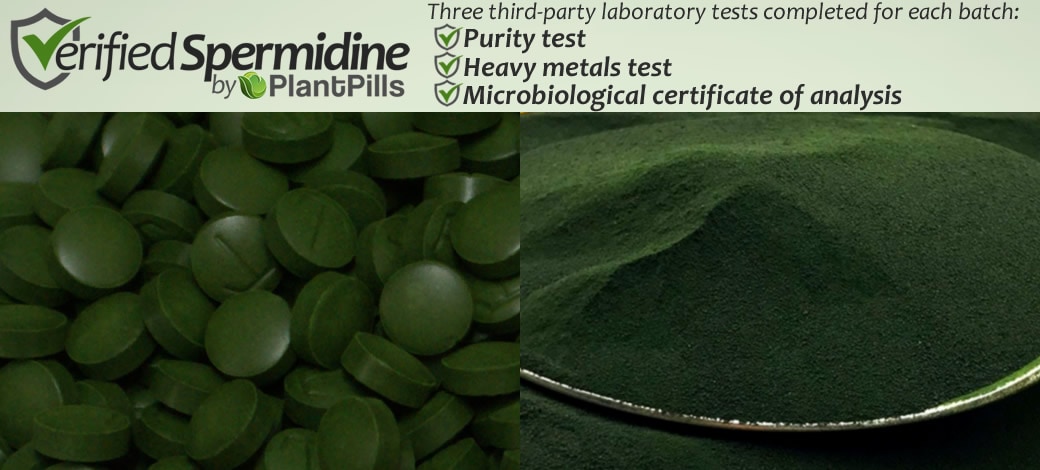
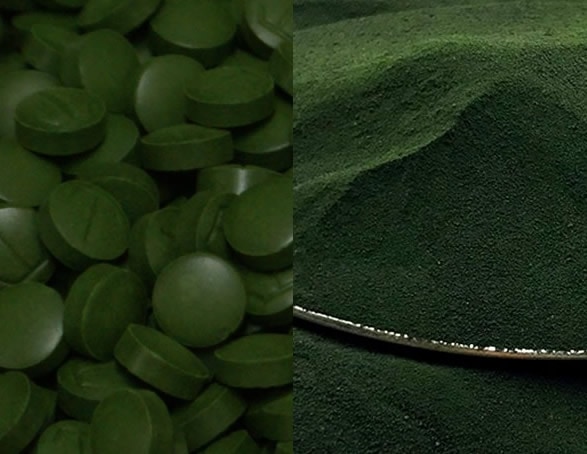
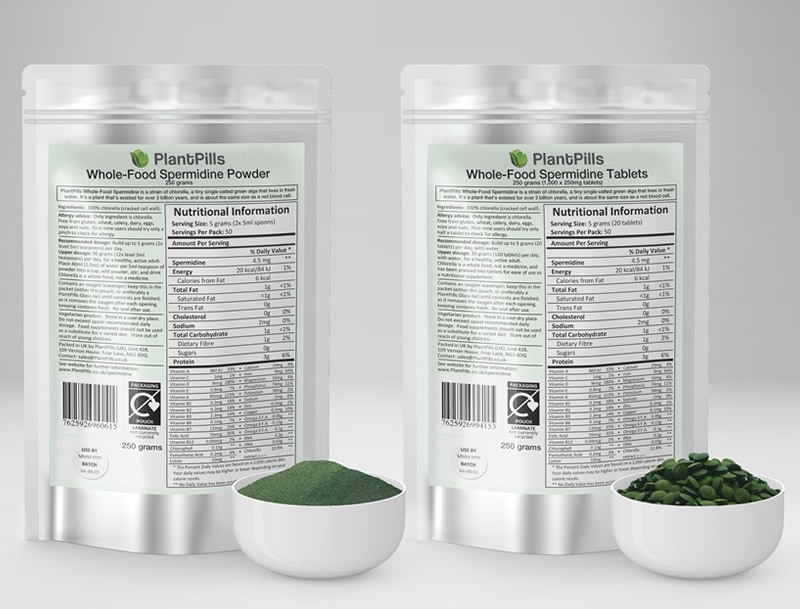




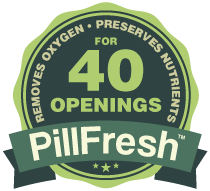 PlantPills Whole-Food Spermidine is a specific strain of chlorella, and it is imperative that chlorella is transported and stored in an oxygen-free environment, even after opening. If chlorella is exposed to oxygen, the nutritional value quickly starts to diminish, because vitamins, enzymes and antioxidants are particularly sensitive to oxygen.
PlantPills Whole-Food Spermidine is a specific strain of chlorella, and it is imperative that chlorella is transported and stored in an oxygen-free environment, even after opening. If chlorella is exposed to oxygen, the nutritional value quickly starts to diminish, because vitamins, enzymes and antioxidants are particularly sensitive to oxygen.
